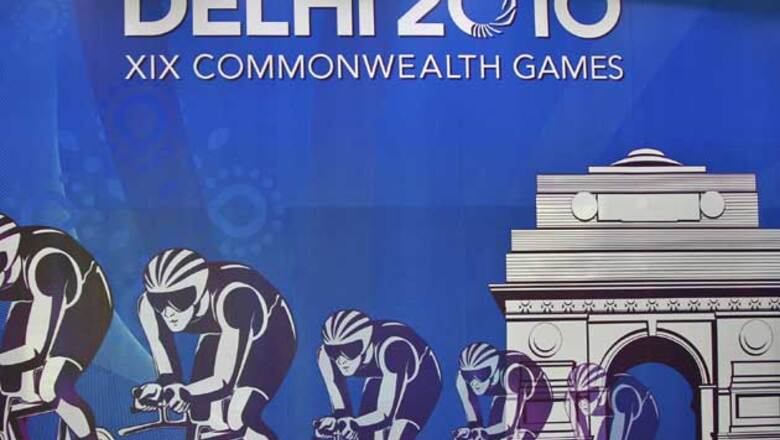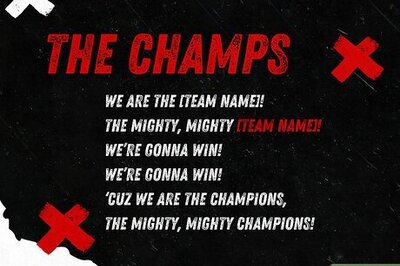
views
New Delhi: It was close to midnight or maybe even after that in New Delhi on November 13, 2003 when the phone rang and the reporter screamed from the other end 'Flash it! India win bid to host 2010 Commonwealth Games, I'll file the story in a bit'.
Far away in Montego Bay, Jamaica - as the reporter later recalled - the 50-member strong Indian delegation broke into a jig after results of the voting were announced. New Delhi 46, Hamilton 22.
The Indian delegation comprised Sports Minister Vikram Verma, Delhi's Lt Governor Vijai Kapoor, the late Minister of State for External Affairs Digvijay Singh, Indian Olympic Association secretary general Randhir Singh, world women's air rifle shooting champion Anjali Bhagwat, former India cricket captain Sunil Gavaskar and former world billiards champion Michael Ferreira among others.
The delegation also carried video messages from then Prime Minister Atal Bihari Vajpayee and the then Opposition leader Sonia Gandhi.
As the Indian delegation celebrated, Canada cried foul. India had made a last-minute offer before the vote to give $ 7.2 million to the Games associations of the 72 Commonwealth members as a fund for development of athletes. Obviously, the move prompted scorn from the Canadians.
Officials said India won the bid because it had never staged the event and the Commonwealth countries voters clearly were sympathetic to complaints from New Delhi that wealthy countries were picked too often.
Canada has hosted four Commonwealth Games, while New Delhi had unsuccessfully bid for the event in 1990 and 1994, and withdrew its bid in favour of Kuala Lumpur for the 1998 Games.
What also seemed to have gone in India's favour was the successful Afro-Asian Games in Hyderabad that were held in October 2003 and where key Commonwealth Games Federation officials were present.
It all looked fine and on track till the bid was won. What happened then?
July 1, 2004: The Indian Olympic Association organised a study tour of senior DDA officials to Sydney, Melbourne and Kuala Lumpur to learn from their Games experience. Seminars and presentations were studied and made during the whole year.
Feb 10, 2005: While India won the bid in November 2003, it took about 16 months to put the the Commonwealth Games Organising Committe in place.
Mar 15, 2005: The first meeting of the Infrastructure Coordination Committee was held in Delhi and it was here that they took note of the requirements of venues and their up-gradation and the construction of the Games village.
Mar 23, 2005: The Games date were fixed from October 3 to 14, 2010 at the first meeting of the Executive Board of the Organising Committee CWG 2010. Assessments, meetings and reviews continued right through the year with two more executive board meetings.
Mar 12, 2006: 71 member countries of the CGF General Assembly in Melbourne unanimously voted to shift the Commonwealth Youth Games from in 2008 from Pune to Delhi.
April 1, 2006: On returning to India from the Melbourne Commonwealth Games, the Commonweatlh Games Federation flag was presented to Prime Minister Manmohan Singh.
July 1, 2006: The team that ran the Melbourne Games interacted with the members of the Delhi 2010 organising committee. The official CWG 2010 site notes this was done so that the "wheel need not be re-invented".
Nov 1, 2006: Prime Minister Manmohan Singh who has had to subsequently play a more active role, first reviewed a presentation of the Games during his first term in office.
Jan 6, 2008: After rounds and rounds of meetings in 2007 that included a CGF coordination visit, the CGF general assembly meet in Sri Lanka and the annual general body meeting of the Delhi Games Organising Committee, the logo for the Games was launched on January 6 to coincide with the '1000 days to go' celebrations.
Feb 9, 2008: The Prime Minister reviewed the preparations again as he visited the Commonwealth Youth Games office in Pune.
May 29, 2008: A high-level delegation of the Organising Committee and a Delhi state government delegation headed by Chief Minister Shiela Dikshit visited Beijing to study the Olympics from May 25 to 29.
Oct 18, 2008: With just under two years to go for the mega event, India Post released a commemorative stamp on 'Shera', the mascot of the Games.
May 14, 2009: With just over 500 days to go for the Games, the fifth Coordination Committee Meeting was held with members of the CGF that included its CEO Mike Hooper.
Sept 16, 2009: Delhi Games Organising Committee Chairman Suresh Kalmadi makes his first "we are on track to host a grand games" statement at a press conference in New Delhi.
Sept 24, 2009: Ther Union Home Secretary assures the Commonweath countries of a "safe and secure" Games.
Sept 25, 2009: With the pressure beginning to mount for delivering the Stadia on time, Kalmadi said the onus was on sub-committees to deliver a great Games.
Oct 10, 2009: CGF President Michael Fennell says Delhi has made 'considerable progress'.
Oct 16, 2009: With the first news of disagreements between the CGF and the IOA, Kalmadi says he will ask Fennell to depute someone "who can work with us". With less then a year to go for the Games, Kalmadi admits that "we need someone who can guide and encourage us".
Oct 29, 2009: The 339-day-long Queen's Baton Relay starts from Buckingham Palace in London.
Dec 30, 2009: The first murmurs of a pull out begin as the British Foreign office denies having advised any of its team not to compete in CWG 2010 even as the CGF "had some concerns about preparations for the Games".
June 25, 2010: Queen's Baton Relay arrives in India through the Wagah border on June 25, 2010.
July 28, 2010: Congress MP and former Union Sports Minister Mani Shankar Aiyar says the Games will fail, starting a war of words with Kalmadi.
July 30, 2010: UK-based AM Films highlights the case of payments with no written contract agreement. The Indian High Commission in London seeks information. Sports minister MS Gill reveals that the estimated cost of staging the Games has escalated from 6.5 billion rupees ($ 142 million) to 115 billion. The Central Vigilance Commission begins investigating the manipulation.
Aug, 2010: Three senior Delhi Games officials are suspended over financial irregularities during the Queen's Baton Relay launch in London in 2009. The government's anti-corruption watchdog identifies 16 projects where financial irregularities are suspected.
Prime Minister Manmohan Singh orders an investigation into the corruption charges. Corruption is suspected in award of contracts and in hiring or purchase of equipment such as air conditioners and treadmills and even toilet paper.
Sept, 2010: Kenya's David Rudisha pulls out citing fatigue after breaking the 800 metres world record twice in August, while Games ambassador Saina Nehwal, India's most high-profile female athlete, criticises the preparation for the Games. She backtracks on her comments hours later, however.
Security fears are highlighted just 13 days before the Games begin following the shooting of two foreign visitors by suspected militants near India's main mosque in Old Delhi. A car also explodes at the same place.
A day after the shooting, a footbridge being built just outside the main venue Jawaharlal Nehru stadium collapses, 27 people are injured. Organisers endure further blow as part of a false ceiling at the weightlifting arena falls in.
New Zealand Olympic Committee make it clear they would have no hesitation in pulling their athletes out of the Commonwealth Games if security measures in Delhi are deemed unsatisfactory; Kalmadi assures that stadia in Delhi are ready to host the event.
Fennell reveals he has written to Indian Cabinet Secretary expressing his doubts that athletes' accommodation will be up to standard and stating that countries who had sent advance parties to Delhi ahead of their athletes had found matters with the accommodation were unresolved.
Sept 24, 2010: England's first batch of athletes fly into Delhi for the Games. Michael Fennell gives a thumbs up to the Games Village. New Zealand says it will not pull out of the Games.
(With inputs from agencies)


















Comments
0 comment